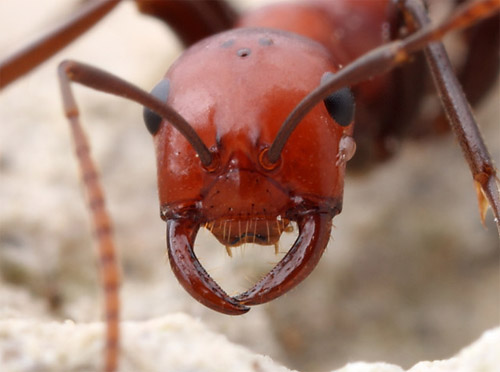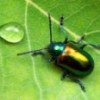
I nominate Polyergus for the worst common name among ants: Amazon Ants. I'm cranky this morning and for some reason this has been irking me.
I now know they were named for their habit of raiding other ant nests, but I spent much of my childhood thinking they were some exotic tropical creature found in places like the...um...Amazon. I never thought to look for Polyergus locally. I was rather confused when, at age 12, I happened on a raid in upstate New York.
As it turns out, this is a common holarctic genus. Polyergus doesn't get anywhere near the real Amazon- it is more at home on the sidewalks of suburban Illinois where I photographed the above individual.
Of course, alternative names for this ant aren't necessarily any better.

You might expect the current reviser of Polyergus to comment, so here goes:
Of course, Amazon refers to the mythological warrior women of ancient times, but usually people don't think of this when I tell them I study "Amazon ants" (trying to avoid the politically and analogically incorrect term "slave-making ants"), and most respond with something like -- So you get to go to Brazil to study them; how cool is that? (My answer, "No I just go out into my back yard. The name comes from blah, blah, blah...)
No need to go into details on the "pirate ant" suggestion, which though it has gained only slightly more traction than the "legionnaire ant" idea (see below), was discussed with some level of animation in the old, print, myrmecological newsletter "Notes from Underground" (See the featured article The Loaded Language of Science By JOAN M. HERBERS and responses:
http://www.notesfromunderground.org/archive/april%202007/contentspage12….)
And there is the aforementioned name "legionnaire ant", which was added in an edit of the article on Polyergus that I wrote for Wikpedia: http://en.wikipedia.org/wiki/Polyergus. The person who made this change (in his editorâs comments) was quite indignant that I had not included this name for the genus, and took it as a personal insult, so I have just left it as is, even though as far as I know this term has only ever been applied to members of the doryline section ("army ants") before the advent of Wikipedia.
Oh yeah, an Asian species of this genus is known by another warrior analogy, âSamurai antâ. As far as I know, the Mongolian species of the genus is not yet known as the âGenghisâs hordes antâ.
Anyway, all this leads me to think I should hold a vernacular name contest for Polyergus. If I like one of the names, the prize for the winner will be publication and appropriate attribution in my revision.
Thanks for your insight on the Polyergus issue, James.
"Legionnaire ant" is preoccupied (insofar as common names can be) by the Dorylomorphs, so I can't bring myself to use it. As you point out.
Maybe "sweatshop ants", for their habit of taking the young members of other colonies to do their work for them. Hmmmm....
What is the small object just below the eye on the right side of the ant's face? Is it a mite?
Hey Rufino. Yeah, that's a mite. Ants (and other insects) are often covered with them. Some mites are merely hanging on for the ride, but others are parasites.
That worker ant needs to cleanm herself better. :P